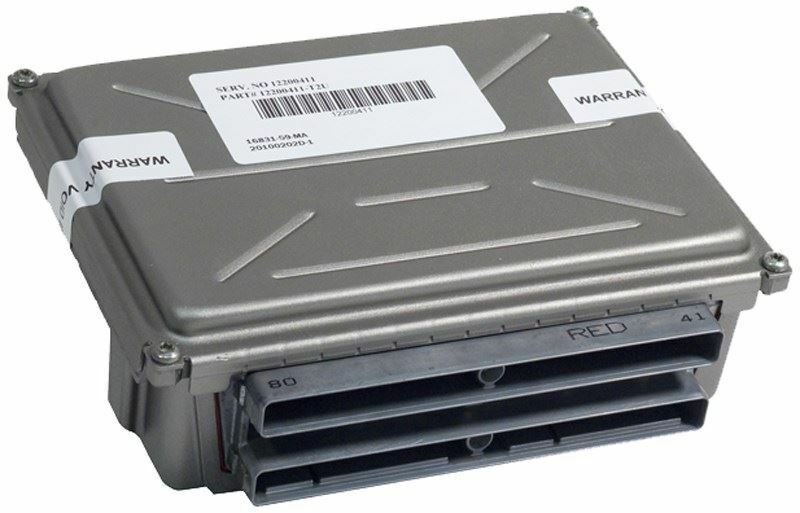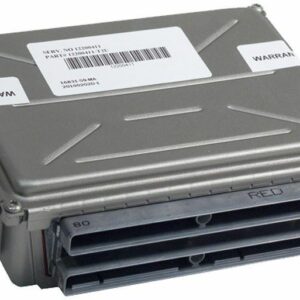If you’re dealing with a 2003-2005 Pontiac Grand Am that’s running rough, stalling unexpectedly, or just doesn’t have the power it used to, a failing Powertrain Control Module (PCM) is a very likely culprit. As a technician with over two decades of experience under the hood, I’ve seen how a faulty engine computer can cause a cascade of frustrating and hard-to-diagnose issues. This isn’t just a part; it’s the central command for your vehicle’s engine and transmission performance. A failing one can leave you stranded.
We take the guesswork and hassle out of the repair. This isn’t just a replacement part; it’s a complete solution. We professionally program this Grand Am Powertrain Module with the latest GM software updates specifically for your vehicle. All we need is your Vehicle Identification Number (VIN) after you place your order. This critical step ensures that when the module arrives, it’s ready to integrate seamlessly with your car’s systems, restoring its original performance and efficiency without a mandatory trip to the dealership for expensive programming.
Is Your Grand Am Showing These Symptoms?
- ✔ Check Engine Light is on with codes like P0601 (Internal Control Module Memory Check Sum Error) or other communication faults.
- ✔ The engine cranks but refuses to start.
- ✔ Unexplained stalling or stumbling, especially when warm.
- ✔ Poor fuel economy that has gotten noticeably worse over time.
- ✔ Harsh or erratic automatic transmission shifting.
- ✔ Failure to pass an emissions or smog test.
- ✔ Intermittent electrical problems that seem to have no other cause.
Case Study: A Tricky Diagnosis
I remember a 2004 Grand Am that came into the shop with a complaint of intermittent stalling. The owner had already replaced the fuel pump and crank sensor with no luck. The car would run fine for days, then suddenly die at a stoplight. No codes were stored initially. After hooking up my scan tool for a live data stream, I noticed the 5-volt reference signal would occasionally drop out for a split second—just long enough to stall the engine but not always set a code. This pointed directly to an internal failure in the PCM. We installed a correctly programmed Grand Am Powertrain Module, and the problem was solved for good. It’s often these subtle internal faults that cause the biggest headaches.
A Straightforward Guide to Installation
For the Pontiac Grand Am and Oldsmobile Alero, the PCM is located inside the vehicle, making it a clean and accessible job for a DIYer. Always consult a service manual for your specific vehicle, but here is a general guide.
- Safety First: Disconnect the negative terminal from your car’s battery and wait at least 15 minutes for the system capacitors to discharge.
- Locate the Module: On the Grand Am, you’ll find the PCM behind the center of the dashboard. Access is typically gained by removing the passenger-side hush panel or glove box assembly.
- Disconnect Connectors: Carefully unclip the wiring harness connectors from the old module. There are usually two or three large connectors with locking levers or tabs. Do not force them.
- Remove the Old PCM: Unbolt the module from its mounting bracket. Keep the hardware as you will reuse it.
- Install the New PCM: Mount your new, pre-programmed module in place and securely fasten it. Reconnect the wiring harnesses, ensuring they click firmly into place.
- Reconnect Battery: Reattach the negative battery terminal.
- Perform Security Relearn: Most GM vehicles of this era require a simple key-cycle security relearn procedure to sync the new PCM with your anti-theft system. This usually involves turning the key to ‘ON’ for 10-15 minutes, then ‘OFF’ for 10 seconds, and repeating this two more times. Your vehicle should then start.
Verified Vehicle Compatibility
This module, part number 12583826 (also compatible with 12583827), is a direct-fit replacement for a wide range of GM vehicles. Please verify your part number and vehicle application from the list below. Providing your VIN during checkout is the best way to guarantee perfect compatibility.
- Alero: 2003 (3.4L, ID 12583827), 2004 (3.4L)
- Aztek: 2003 (ID 12583827), 2004-2005
- Bonneville: 2004-2005 (3.8L)
- Century: 2003-2005
- Grand Am: 2003 (3.4L, ID 12583827), 2004-2005 (3.4L)
- Grand Prix: 2003 (3.1L, ID 12583827)
- Impala: 2003 (3.4L, ID 12583827), 2004-2005
- LeSabre: 2004-2005
- Malibu: 2003 (ID 12583827)
- Monte Carlo: 2003 (3.4L, ID 12583827), 2004-2005
- Montana: 2003-2004, 2005 (Base)
- Park Avenue: 2004 (ID 12583827), 2005
- Rendezvous: 2003-2005 (ID 12583827)
- Silhouette: 2003-2004
- Venture: 2003 (ID 12583827), 2004-2005
Frequently Asked Questions
How does the programming process work?
It’s simple. After you complete your purchase, you will need to send us your vehicle’s 17-digit VIN. Our technicians will use your VIN to access the latest official GM software for your exact vehicle and flash it onto the module before shipping. This ensures it’s a true plug-and-play solution.
Do I need any special tools to install this?
For most of the listed vehicles, you only need basic hand tools like a socket set and screwdrivers to access and replace the module. No special programming tools are required on your end because we handle that for you.
What is the GM Security Relearn Procedure?
This is a required anti-theft system reset. After installing the new PCM, the car won’t start until it’s done. The standard procedure is: 1) Turn key to ON position (don’t start). 2) Leave it for 10-15 minutes until the ‘Security’ light turns off or stops flashing. 3) Turn key OFF for 10 seconds. 4) Repeat steps 1-3 two more times for a total of three cycles. The vehicle will then learn the new module and should start.
Is this compatible with part number 12583827?
Yes, this module part number 12583826 is a fully compatible and interchangeable replacement for part number 12583827. We will program it to function perfectly for your vehicle’s application.
Will this fix my car’s specific problem?
This module corrects issues directly caused by a faulty PCM, such as the symptoms listed above. While it is a common failure point, we always recommend proper vehicle diagnostics to confirm the PCM is the root cause of your problem before ordering.



